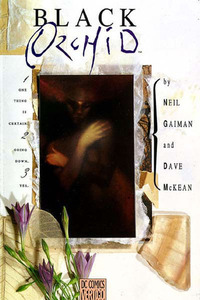Take a photo of a barcode or cover
Hands down the most beautiful comic/graphic book I have ever read. The artwork is stunning, and the story is complimentary to it. There are a few familiar characters (Poison Ivy, Swamp Thing, Lex Luthor, Batman etc) but it's is Black Orchid who makes it really worth reading. Though to be honest, the art is so gorgeous I'd probably read it even if the story was crap. Luckily, the story and writing is equal to its illustrations. I'm pretty sure I'm just repeating myself but there isn't really a lot more to say. Read it.
I was drawn to this after looking through the TPBs at a local comic book shop. It’s absolutely gorgeous. My experience with Dave McKean before has just been the covers for Sandman, which are pretty different. My attraction to his art was 95% of the reason I read this.
The first issue was intriguing. There are these plant women that are kind of superhero-y. Some dude made them. They are kind of the same woman but not.
The driving force of the second and third issues was the “who am I” syndrome and it got a little repetitive. I wanted her to do cool things. But it is still gorgeous so I read on. The underwhelmingness of the story is what gets the three stars. I recommend flipping through it, though.
The first issue was intriguing. There are these plant women that are kind of superhero-y. Some dude made them. They are kind of the same woman but not.
The driving force of the second and third issues was the “who am I” syndrome and it got a little repetitive. I wanted her to do cool things. But it is still gorgeous so I read on. The underwhelmingness of the story is what gets the three stars. I recommend flipping through it, though.
An interesting albiet short comic book, the introduction had me expecting more than was there (it said the ending shocked many people and caused distress, I wasn't distressed or anything else for that matter).
Black Orchid is a superhero active in the DC universe. She solves crimes. This is the story of how she dies. Pretty straightforward, huh?
Starting out, I want to make clear that my Batman lore has its holes. My overall DC lore is spotty at best. Comics are hard to keep track of, especially when canon changes at the drop of a hat. There are so many different universes for the same characters now that you'll never be able to catch up to them if you fall behind. "Canon" is very vague.
Maybe this not-perfectly-up-to-date lore was the reason I didn't enjoy this comic. Maybe. Black Orchid is such an obscure DC hero that I thought the comic would introduce her and her powers a little more. Yes, she's shown in a very clever disguise at the start of the comic, but what with the purple skin and super strength, it didn't really come across that disguises were her main shtick (I had to google her to find that out). There were also a high number of other villains and heroes' names thrown around - their "civilian" names that is - which I had to google too, because they were closely entangled with the plot.
But my lack of DC knowledge wasn't the only thing that lessened by enjoyment of this, now that I think about it. Don't know how much was established about Black Orchid's background before this comic was written, but there are some...tiresome clichés about. Abusive ex-husband? Abusive father? Strong hints of manic pixie dream girl? Mostly male associates/nemesises/friends? Male BFF who's had a crush on her forever and would be so much better for her? Yup, the Strong Female Character tropes kept rolling in throughout this story. And Black Orchid's successor - the adult shaped one - also got a strong dose of Born Sexy Yesterday, which squicks the hell out of me.
Making the DC universe grimdark is nothing new. Seeing as this comic isn't new either, I really shouldn't have been surprised that everything was portrayed as Dark and Terrible. But did they really have to state that the staff at Arkham rape their female prisoners? Really? I know the "revolving door" at Arkham has been an in-joke for a long time, but can we at least pretend it's a place where the staff try to rehabilitate people? Don't think the Bat would send people off to a place where they'll get zero rehab and all the extra trauma they don't need (unless we're talking about the Bat's body-double Crazy Steve, who usually shows up instead when people like Frank Miller is writing him. Must be a union thing).
Oh, and speaking of Batman. His cameo? It felt off to me. Yeah, Batman isn't exactly a helicopter parent (well, depending on which version of him you look at), but when amnesia riddled super people come up to him and ask who they are, he'd probably do more than direct them to people they can maybe ask questions. Especially if they're asking to speak to Poison Ivy. Felt a bit like they had to pay per frame for the Bat, so that they tried to use him as little as possible.
Last (and least) thing that bugged me was the constant use of lyrics in the comic. If this had been a short film they music would likely have brought a certain mood to the scenes. In silent comic form tens upon tens of speech bubbles not related to the actual plot or scene were distracting and annoying.
So yeah, reccing this to people who like grimdark!DC and who can stand a hailstorm of clichés regarding female characters. Will not be re-reading it myself.
Starting out, I want to make clear that my Batman lore has its holes. My overall DC lore is spotty at best. Comics are hard to keep track of, especially when canon changes at the drop of a hat. There are so many different universes for the same characters now that you'll never be able to catch up to them if you fall behind. "Canon" is very vague.
Maybe this not-perfectly-up-to-date lore was the reason I didn't enjoy this comic. Maybe. Black Orchid is such an obscure DC hero that I thought the comic would introduce her and her powers a little more. Yes, she's shown in a very clever disguise at the start of the comic, but what with the purple skin and super strength, it didn't really come across that disguises were her main shtick (I had to google her to find that out). There were also a high number of other villains and heroes' names thrown around - their "civilian" names that is - which I had to google too, because they were closely entangled with the plot.
But my lack of DC knowledge wasn't the only thing that lessened by enjoyment of this, now that I think about it. Don't know how much was established about Black Orchid's background before this comic was written, but there are some...tiresome clichés about. Abusive ex-husband? Abusive father? Strong hints of manic pixie dream girl? Mostly male associates/nemesises/friends? Male BFF who's had a crush on her forever and would be so much better for her? Yup, the Strong Female Character tropes kept rolling in throughout this story. And Black Orchid's successor - the adult shaped one - also got a strong dose of Born Sexy Yesterday, which squicks the hell out of me.
Making the DC universe grimdark is nothing new. Seeing as this comic isn't new either, I really shouldn't have been surprised that everything was portrayed as Dark and Terrible. But did they really have to state that the staff at Arkham rape their female prisoners? Really? I know the "revolving door" at Arkham has been an in-joke for a long time, but can we at least pretend it's a place where the staff try to rehabilitate people? Don't think the Bat would send people off to a place where they'll get zero rehab and all the extra trauma they don't need (unless we're talking about the Bat's body-double Crazy Steve, who usually shows up instead when people like Frank Miller is writing him. Must be a union thing).
Oh, and speaking of Batman. His cameo? It felt off to me. Yeah, Batman isn't exactly a helicopter parent (well, depending on which version of him you look at), but when amnesia riddled super people come up to him and ask who they are, he'd probably do more than direct them to people they can maybe ask questions. Especially if they're asking to speak to Poison Ivy. Felt a bit like they had to pay per frame for the Bat, so that they tried to use him as little as possible.
Last (and least) thing that bugged me was the constant use of lyrics in the comic. If this had been a short film they music would likely have brought a certain mood to the scenes. In silent comic form tens upon tens of speech bubbles not related to the actual plot or scene were distracting and annoying.
So yeah, reccing this to people who like grimdark!DC and who can stand a hailstorm of clichés regarding female characters. Will not be re-reading it myself.
dark
slow-paced
challenging
dark
slow-paced
Plot or Character Driven:
Plot
Strong character development:
No
Loveable characters:
No
Diverse cast of characters:
No
Flaws of characters a main focus:
Yes
Intéressante, quoiqu'assez difficillement compréhensible, histoire mettant en scène des femmes-fleurs.
Le récit n'est pas rempli de bruit et de fureur, mais plutôt lourd , limite ennivrant.
Le récit n'est pas rempli de bruit et de fureur, mais plutôt lourd , limite ennivrant.
This comic book was really something. I don't think I really get what it is actually about on a less than surface level, (there was a confusing bomb dropped on the last page...) but I did enjoy the adventure and the art. Look at those colors! And Batman even made an appearance! So that was cool. I think this story is also part of The Sandman world, and the general large-ness of the comic book world overwhelms me.
An important example of the re-creation and reimagining of comics by British authors during the mid eighties, Black Orchid combines Gaiman's mythology with McKean's powerful artistic visions in the series which made their careers.
Like Moore's 'Swamp Thing' or Morrison's 'Animal Man', Gaiman was given the opportunity to place his stamp on a pre-existing hero; and like the others, by betraying cliche and embracing a suitably mystic sense of realism, succeeds admirably. (as an aside, Watchmen was supposed to be such a recreation of old heroes, but was dubbed too different from the original; of course, that decision is questionable as [b:Watchmen|472331|Watchmen|Alan Moore|http://d202m5krfqbpi5.cloudfront.net/books/1327866860s/472331.jpg|4358649] is the most well-respected comic there has ever been)
From the very beginning of the three chapter series, Gaiman powerfully informs the reader of his intent to leave behind tradition and embark on a psychological exploration of the limits of the genre. This brave errancy is ably illustrated by the higher art aesthetic of McKean's, whose own sense of both magic and realistic depiction provides Gaiman's words an excellent partner.
In this highly experimental attempt, Gaiman does not fall to the usual high-falutin storylines, which is instead replaced with the vague and spiritual. Likewise, his often choiceless, lead-along stories become less recognizable in the emotional and intellectual extremes of Black Orchid.
The story does often move at a vague and paceless rate, and denies the simple morality or causal chain which we are so used to even out of comics. He also moves along a dangerous path: that of the romanticization of ecology and tribal life; however, he does not quite fall to it.
His story is emotional and personal in a way that super hero comics rarely attain, and part of this is because of the absolute denial of standard methods which McKean makes available to him by an alternate artistic representation. If it doesn't look like comics, is it still comics? Gaiman would say yes--so would McCloud--and so do I; but we are all a bit odd for it.
Gaiman also does proud the old comic fan with a score of intertwined heroes and villains of the past, though a reader without the foreknowledge may have to take his word a bit too often. The superior plan is to begin with Alan Moore's aforementioned Swamp Thing before tackling Black Orchid.
Though Sandman will undeniably reign as Gaiman's signature series, it is sometimes preferable to boldly make your 'X' and move along, rather than dither over the serif. In Black Orchid, Gaiman makes his mark.
My Suggested Readings in Comics
Like Moore's 'Swamp Thing' or Morrison's 'Animal Man', Gaiman was given the opportunity to place his stamp on a pre-existing hero; and like the others, by betraying cliche and embracing a suitably mystic sense of realism, succeeds admirably. (as an aside, Watchmen was supposed to be such a recreation of old heroes, but was dubbed too different from the original; of course, that decision is questionable as [b:Watchmen|472331|Watchmen|Alan Moore|http://d202m5krfqbpi5.cloudfront.net/books/1327866860s/472331.jpg|4358649] is the most well-respected comic there has ever been)
From the very beginning of the three chapter series, Gaiman powerfully informs the reader of his intent to leave behind tradition and embark on a psychological exploration of the limits of the genre. This brave errancy is ably illustrated by the higher art aesthetic of McKean's, whose own sense of both magic and realistic depiction provides Gaiman's words an excellent partner.
In this highly experimental attempt, Gaiman does not fall to the usual high-falutin storylines, which is instead replaced with the vague and spiritual. Likewise, his often choiceless, lead-along stories become less recognizable in the emotional and intellectual extremes of Black Orchid.
The story does often move at a vague and paceless rate, and denies the simple morality or causal chain which we are so used to even out of comics. He also moves along a dangerous path: that of the romanticization of ecology and tribal life; however, he does not quite fall to it.
His story is emotional and personal in a way that super hero comics rarely attain, and part of this is because of the absolute denial of standard methods which McKean makes available to him by an alternate artistic representation. If it doesn't look like comics, is it still comics? Gaiman would say yes--so would McCloud--and so do I; but we are all a bit odd for it.
Gaiman also does proud the old comic fan with a score of intertwined heroes and villains of the past, though a reader without the foreknowledge may have to take his word a bit too often. The superior plan is to begin with Alan Moore's aforementioned Swamp Thing before tackling Black Orchid.
Though Sandman will undeniably reign as Gaiman's signature series, it is sometimes preferable to boldly make your 'X' and move along, rather than dither over the serif. In Black Orchid, Gaiman makes his mark.
My Suggested Readings in Comics






